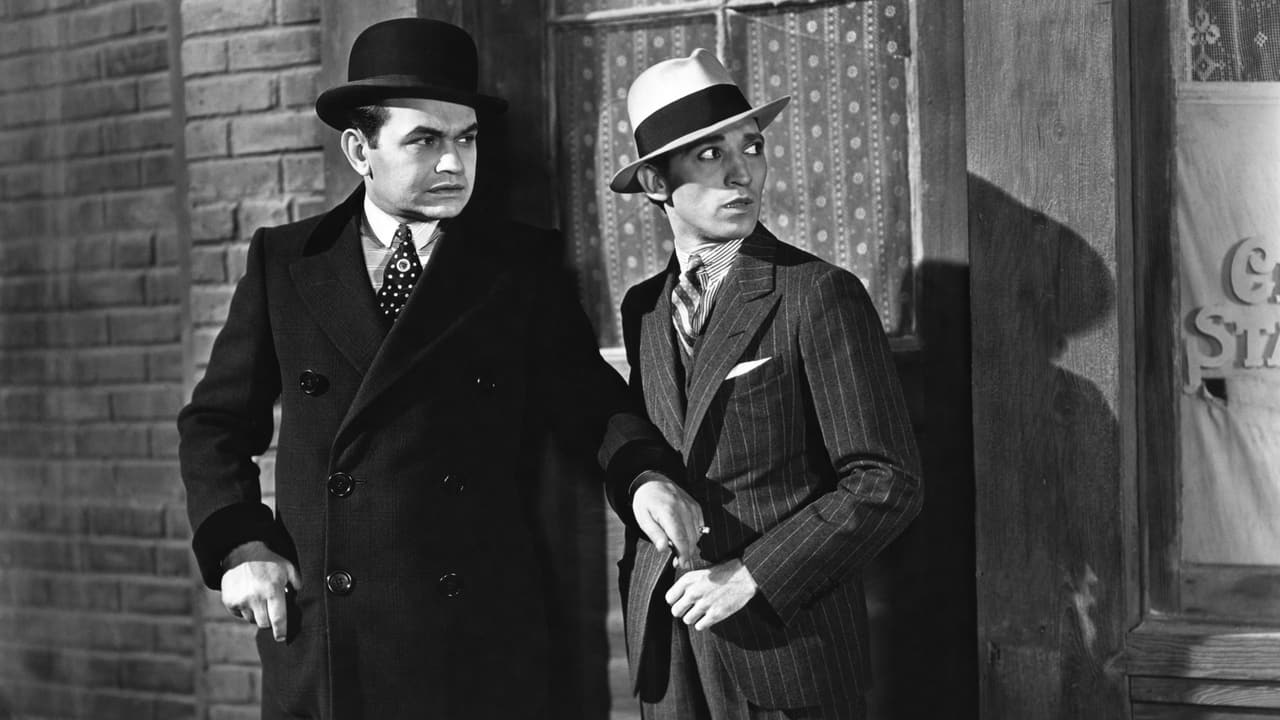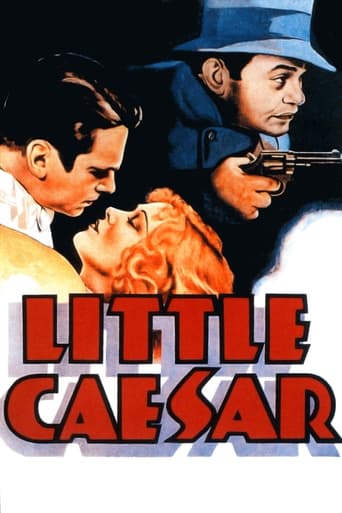ChanFamous
I wanted to like it more than I actually did... But much of the humor totally escaped me and I walked out only mildly impressed.
Taraparain
Tells a fascinating and unsettling true story, and does so well, without pretending to have all the answers.
Michelle Ridley
The movie is wonderful and true, an act of love in all its contradictions and complexity
Quiet Muffin
This movie tries so hard to be funny, yet it falls flat every time. Just another example of recycled ideas repackaged with women in an attempt to appeal to a certain audience.
ma-cortes
Powerful portrait of the rise and fall of a nasty mobster extraordinarily performed by Edward G Robinson . A heinous and villain hoodlum named Rico (Edward G. Robinson) moves from the country to the big town and joins Sam Vettori's gang along with his fellow Joe Massara (Clark Gable was originally considered for the part but Jack L. Warner decided that Gable's ears were too big, and the role went to Douglas Fairbanks Jr. instead) to rise up through the ranks of the city underworld . Soon he becomes the boss of the mobsters and known as Little Caesar, and gets closer to the great gangster Pete Montana (Ralph Ince) and Big Boy (Sidney Blackmer) . The character of Cesare Enrico Bandello is not, as widely believed, based on Al Capone. Instead, he is based on Salvatore "Sam" Cardinella, a violent Chicago gangster who operated in the early years of Prohibition . And the role of Joe Massara was based on actor George Raft, who was associated with Owney Madden, the man who organized the taxi racket in New York City. The movie results to be one of the great mobsters pictures , and an expertly directed film that made Edward G Robinson a superstar . Despite the film's huge success, the book's author, W.R. Burnett, was furious that no actual Italians were cast in the film . Classic gangster movie contains top-notch performances , intense drama , thrills , fast-paced , action , and a shocking final . Magnificent Edward G Robinson in the title role as a snarling and ominous gangster . In one scene, Edward G. Robinson had to fire a pistol while facing the camera , try as he might, he was unable to keep his eyes open each time he pulled the trigger . Producer Hal B. Wallis originally auditioned Edward G. Robinson for the supporting role of Otero -played in the film by George Stone- before deciding he was perfect as Rico . Although The Doorway to Hell(1930), a gangster film released by Warner Bros. in 1930 was a big hit at the time, most sources consider Little Caesar to be the film which started a brief craze for the genre in the early 1930s. The "Forward" that now appears on the beginning of the film was added for the 1954 re-release of Little Caesar and The public enemy (1931) as a combination package.The character Diamond Pete Montana was modeled on Jim Colosimo, who was murdered by Al Capone; and "The Big Boy" was based on corrupt politician William 'Big Bill' Thompson, Mayor of Chicago. The underworld banquet sequence was also based on a real event - a notorious party in honor of two gangsters, Charles Dion O'Bannion and Samuel J. "Nails" Morton, which received unfavorable coverage in the Chicago press. This First National Vitaphone early talking picture was well directed by Mervyn LeRoy and ready for release in December 1930, but Warner's brass felt it was not a Christmas picture , it officially debuted at the Strand Theatre in New York City on 9 January 1931. It ranked #9 on the American Film Institute's list of the 10 greatest films in the genre "Gangster" in June 2008.
AaronCapenBanner
Mervyn Leroy directed this early gangster picture that stars Edward G. Robinson as Rico, a tough-minded man who is determined to make something of himself, and so he, along with his friend Joe Massara(played by Douglas Fairbanks Jr.) goes to the big city, where they join a gang, and Rico quickly rises to the top, taking it over, and calling himself Little Caesar. He then sets his sights on a bigger gang, but after a high-profile assassination, Rico finds that despite his power and wealth, his violent lifestyle will catch up with him in the end... Robinson is the whole show here, so memorable is his performance that it makes up for the stilted nature of the picture.
Casablanca3784
By today's standards, "Little Caesar" could be considered corny but if one wants to put himself in 1931, the film is masterful. I call it the grandaddy of all gangster films and very reminiscent of the biography of Al Capone.Edward G.Robinson was more than just a "pretty face." This man could act up a storm. Recently I saw "Key Largo" and was very impressed by EGR's acting. Now I see where it came from--he was born to play hard boiled gangsters and why he wasn't nominated in '31 for Best Actor of the Year is beyond me.Lionel Barrymore took home the statue. Robinson was simply fantastic.I highly recommend your watching it on Turner or renting the DVD because you will see the beginning of the evolution of murder and mayhem on the silver screen. What the Volstead Act spawned. The roots of Capone, Bonnie and Clyde, "Pretty Boy" Floyd, "Machine Gun Kelly" and all the rest of the psychopaths that terrorized good people and honest businessmen.This movie is not only a movie but a history lesson as well.Because of our marvelous Constitution and Bill of Rights, a two bit hood like Rico could evade the law until.................see the film--it's great.
Bill Slocum
As the first mobster to make a big dent in cinema, Rico "Little Caesar" Bandello deserves respect. But does he make for a great movie? I say no.After a final gas station hold-up, Rico (Edward G. Robinson) and pal Joe Massara (Douglas Fairbanks Jr.) breeze into the big city to score with mob boss Sam Vettori (Stanley Fields) and his crew. Soon Rico is the one running things, but will his itchy trigger finger and habitual line-stepping run him afoul of police Sergeant Flaherty (Thomas E. Jackson)?"The bigger they come, the harder the fall," Rico boasts. "I ain't doin' bad in this business so far."The problem with "Little Caesar" is obvious from the start and more so as the film progresses: Rico is an idiot. He only makes it as far as he does because all the hoods he messes with, like Sam, are even dumber. When he takes over Sam's gang, he just tells Sam he's through and that's that. When he wants to make a statement about running things, he throws a party and invites the papers. When he starts shooting, he zaps the new crime commissioner and then tells everyone to mind not to say nothing about it.Maybe if the film showed this to be dumb behavior, I'd feel a little different. But instead this is suggested as being the typical road to hoodlum hegemony, and highly effective if not for a human foible or two that slip Rico up.Robinson stands out in the flawed proceedings almost as much by default as by his considerable talent. He's great with his rough banter, and his flourishes with his cigar, but he is playing a Snidley Whiplash caricature and it shows.It reminds me of another Romanian-born actor who made his big splash in movies the same year, Bela Lugosi in "Dracula." Both films are atmospheric potboilers focused on a single over-the-top villain. Both are sadly diminished by time with their formulaic conventions, weak supporting cast, and creaky early-sound production.When "Little Caesar" wants to project menace, we see Rico warn people "my gun's gonna speak its piece," only he doesn't really do much with it. Fairbanks is lost as a lamb in a hurricane playing Joe, especially when he hooks up with Glenda Farrell and tries to make his break from Rico, a matter the film pushes into the background until the last 15 minutes. Watching Fairbanks and Farrell have their clinches reminds you of what was so wrong with early talkies: Even in a clinch, the lovers always shouted at each other.Though a Pre-Code film, "Little Caesar" makes strange concessions to regional censors. When someone is shot, director Mervyn LeRoy is careful not to show Rico or anyone else actually pulling the trigger. There's no mention of booze, or vice, or any other illegal activity. Apparently these guys make all their money holding up each other's parties.Critics looking at the film today scrape for matters of interest such as Rico's possible homosexuality, and the matter of how mob activity might be seen as mirroring big business. But in the end, what you get here is a thin story featuring a character who defies gravity and convention without doing very much of anything interesting.Maybe I should be more grateful to "Little Caesar" for paving the way to other, better gangster films of the 1930s. By itself it is a curio more than anything else, testament to one big talent who left a lasting impression but would make his mark on better films to come.

